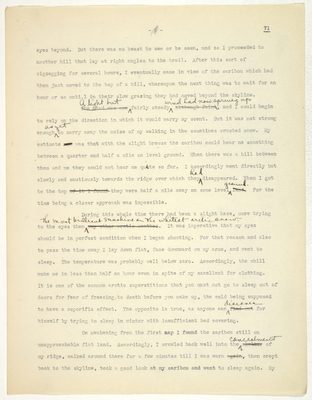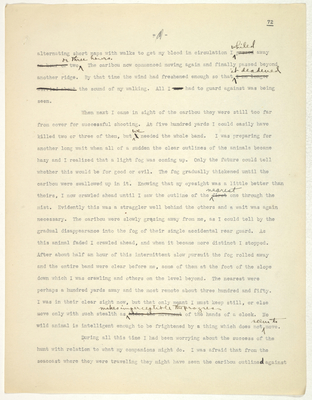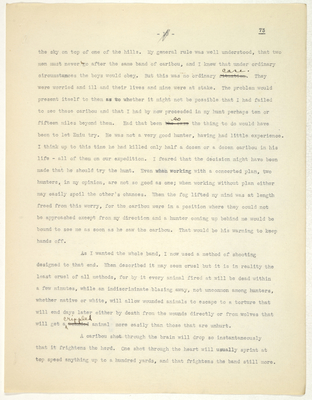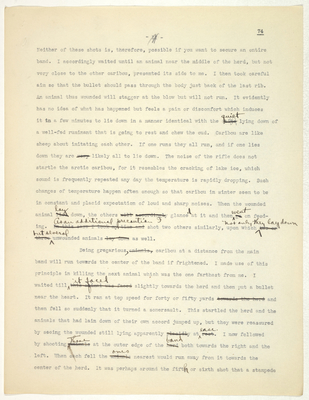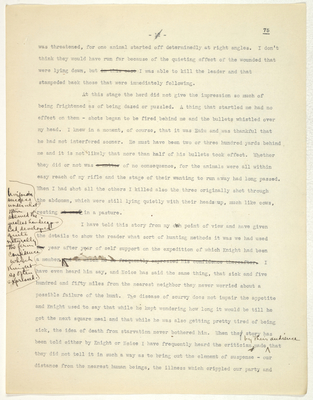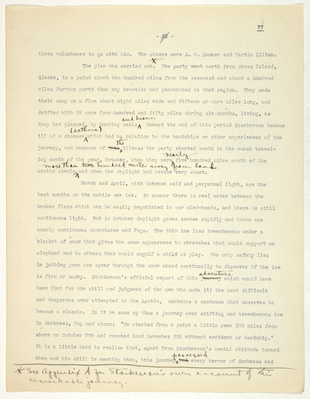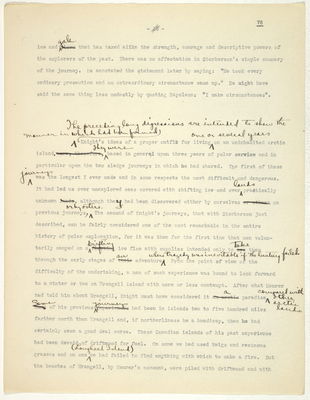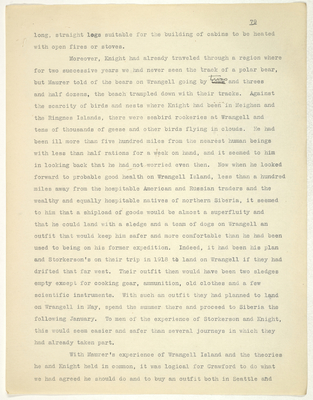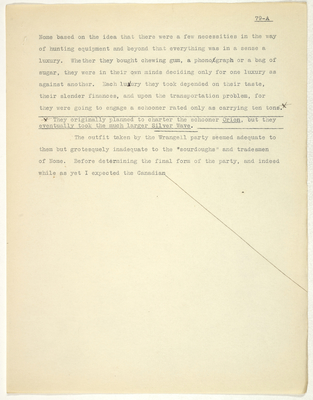Pages That Need Review
stefansson-wrangel-09-27
stefansson-wrangel-09-27-029
71
- 8 -
eyes beyond. But there was no beast to see or be seen, and so I proceeded to another hill that lay at right angles to the trail. After this sort of zigzagging for several hours, I eventually came in view of the caribou which had then just moved to the top of a hill, whereupon the next thing was to wait for an hour or so unti.l in their slow grazing they had moved beyond the skyline. The wind was now A light but fairly steady wind had now sprung up although faint, and I could begin to rely on the direction in which it would carry my scent. But it was not strong enough as yet to carry away the noise of my walking in the sometimes crusted snow. My estimate [30m] was that with the slight breeze the caribou could hear me something between a quarter and half a mile on level ground. When there was a hill between them and me they could not hear me quite so far. I accordingly went directly but slowly and cautiously towards the ridge over which they had disappeared. When I got to the top of it I found they were half a mile away on some level land ground. For the time being a closer approach was impossible.
During this whole time there had been a slight haze, more trying to the eyes than The most brilliant sunshine on the whitest arctic snow. any other arctic weather. It was imperative that my eyes should be in perfect condition when I began shooting. For that reason and also to pass the time away I lay down flat, face downward on my arms, and went to sleep. The temperature was probably well below zero. Accordingly, the chill woke me in less than half an hour even in spite of my excellent fur clothing. It is one of the common arctic superstitions that you must not go to sleep out of doors for fear of freezing to death before you wake up, the cold being supposed to have a soporific effect. The opposite is true, as anyone can discover find out for himself by trying to sleep in winter with insufficient bed covering.
On awakening from the first nap I found the caribou still on unapproachable flat land. Accordingly, I crawled back well into the concealment shelter of my ridge, walked around there for a few minutes till I was warm again, then crept back to the skyline, took a good look at my caribou and went to sleep again. By
stefansson-wrangel-09-27-030
72
- 9 -
alternating short naps with walks to get my blood in circulation I whiled passed away an hour or two or three hours. The caribou now commenced moving again and finally passed beyond another ridge. By that time the wind had freshened enough so that it deadened I no longer worried about the sound of my walking. All I [now] had to guard against was being seen.
When next I came in sight of the caribou they were still too far from cover for successful shooting. At five hundred yards I could easily have killed two or three of then, but we needed the whole band. I was preparing for another long wait when all of a sudden the clear outlines of the animals became hazy and I realized that a light fog was coming up. Only the future could tell whether this would be for good or evil. The fog gradually thickened until the caribou were swallowed up in it. Knowing that my eyesight was a little better than theirs, I now crawled ahead until I saw the outline of the nearest first one through the mist. Evidently this was a straggler well behind the others and a wait was again necessary. The caribou were slowly grazing away from me, as I could tell by the gradual disappearance into the fog of their single accidental rear guard. As this animal faded I crawled ahead, and when it became more distinct I stopped. After about half an hour of this intermittent slow pursuit the fog rolled away and the entire band were clear before me, some of them at the foot of the slope down which I was crawling and others on the level beyond. The nearest were perhaps a hundred yards away and the most remote about three hundred and fifty. I was in their clear sight now, but that only meant I must keep still, or else move only with such stealth as makes imperceptible the progress hides the movement of the hands of a clock. No wild animal is intelligent enough to be frightened by a thing which does not seem to move.
During all this time I had been worrying about the success of the hunt with relation to what my companions might do. I was afraid that from the seacoast where they were traveling they might have seen the caribou outlined against
stefansson-wrangel-09-27-031
73
- 10 -
the sky on top of one of the hills. My general rule was well understood, that two men must never go after the same band of caribou, and I knew that under ordinary circumstances the boys would obey. But this was no ordinary situation. They were worried and ill and their lives and mine were at stake. The problem would present itself to them as "to whether it might not be possible that I had failed to see these caribou and that I had by now proceeded in my hunt perhaps ten or fifteen miles beyond them. Had that been so the thing to do would have been to let Emiu try. He was not a very good hunter, having had little, experience. I think up to this time he had killed only half a dozen or a dozen caribou in his life - all of them on our expedition. I feared that the decision might have been made that he should try the hunt. Even when working with a concerted plan, two hunters, in my opinion, are not so good as one; when working without plan either may easily spoil the other's chances. When the fog lifted my mind was at length freed from this worry, for the caribou were in a position where they could not be approached except from my direction and a hunter coming up behind me would be bound to see me as soon as he saw the caribou. That would be his warning to keep hands off.
As I wanted the whole band, I now used a method of shooting designed to that end. When described it may seem cruel but it is in reality the least cruel of all methods, for by it every animal fired at will be dead within a few minutes, while an indiscriminate blazing away, not uncommon among hunters, whether native or white, will allow wounded animals to escape to a torture that will end days later either by death from the wounds directly or from wolves that will get a crippled animal more easily than those that are unhurt.
A caribou shot through the brain will drop so instantaneously that it frightens the herd. One shot through the heart will usually sprint at top speed anything up to a hundred yards, and that frightens the band still more.
stefansson-wrangel-09-27-032
74
- 11 -
Neither of these shots is, therefore, possible if you want to secure an entire band. I accordingly waited until an animal near the middle of the herd, but not very close to the other caribou, presented its side to me. I then took careful aim so that the bullet should pass through the body just back of the last rib. An animal thus wounded will stagger at the blow but will not run. It evidently has no idea of what has happened but feels a pain or discomfort which induces it in a few minutes to lie down in a manner identical with the quite quiet lying down of a well-fed ruminant that is going to rest and chew the cud. Caribou are like sheep about imitating each other. If one runs they all run, and if one lies down they are very likely all to lie down. The noise of the rifle does not startle the arctic caribou, for it resembles the cracking of lake ice, which sound is frequently repeated any day the temperature is rapidly dropping. Such changes of temperature happen often enough so that caribou in winter seem to be in constant and placid expectation of loud and sharp noises. ’Then the wounded animal lies lay down, the others will accordingly glanced at it and then went go on feeding. In this case I took my time and As an additional precaution shot two others similarly, upon which not only they lay down two or three but several unwounded animals lay down as well.
Being gregarious, animals, caribou at a distance from the main band will run towards the center of the band if frightened. I made use of this principle in killing the next animal which was the one farthest from me. I waited till it faced this animal was face slightly towards the herd and then put a bullet near the heart. It ran at top speed for forty or fifty yards towards the herd and then fell so suddenly that it turned a somersault. This startled the herd and the animals that had lain down of their own accord jumped up, but they were reassured by seeing the wounded still lying, apparently placidly at ease.rest. I now followed by shooting these anima1s at the outer edge of the herd both towards the right and the left. When each fell the animals ones nearest would run away from it towards the center of the herd. It was perhaps around the fifth or sixth shot that a stampede
stefansson-wrangel-09-27-033
75
- 12 -
was threatened, for one animal started off determinedly at right angles. I don't think they would have run far because of the quieting effect of the wounded that were lying down, but in this case I was able to kill the leader and that stampeded back those that were immediately following.
At this stage the herd did not give the impression so much of being frightened as of being dazed or puzzled. A thing that startled me had no effect on them - shots began to be fired behind me and the bulletp whistled over my head. I knew in a moment, of course, that it was Emiu and was thankful that he had not interfered sooner. He must have been two or three hundred yards behind me and it is not likely that more than half of his bullets took effect. Whether they did or not was a matter of no consequence, for the animals were all within easy reach of my rifle and the stage of their wanting to run away had long passed. When I had shot all the others I killed also the three originally shot through the abdomen, which were still lying quietly with their heads up, much like cows, resting at ease in a pasture.
I have told this story from my own point of view and have given details to show the reader what sort of hunting methods it was we had used for year after year of self support on the expedition of which Knight had been a member. Uniform success under what often seemed the greatest hadnicap had developed quite naturally the firm confidence which Knight so often expressed.and in which he so frequently expressed his confidence thereafter. have even heard him say, and Noice has said the same thing, that sick and five hundred and fifty miles from the nearest neighbor they never worried about a possible failure of the hunt. The disease of scurvy does not impair the appetite and Knight used to say that while he kept wondering how long it would be till he got the next square meal and that while he was also getting pretty tired of being sick, the idea of death from starvation never bothered him. When they story has been told either by Knight or Noice I have frequently heard the criticism, made by their audience that they did not tell it in such a way as to bring out the element of suspense - our distance from the nearest human beings, the illness which crippled our party and
stefansson-wrangel-09-27-034
76
- 13 -
the uncertainty of getting game in time. I have always sympathized with these critics, for both my memory and diary tell that I was a bit frightened. at the time I have had the feeling that in the subsequent rapid and exhilarating recovery when they got plenty of underdone meat to eat both sick men must have lost the memory of their previous gloom and worry.
It took only three days until the acute symptoms of scurvy had disappeared. There had been the blackest gloom in their minds and pain in their every joint, but both, vanished disappeared after three days of underdone and raw meat. Their traveling strength came back more slowly and it was several nearly weeks until we were on the road again. It was Only after we got back to “civilization" that did I realized that this experience had planted in the minds of my companions a faith in the safety of northern travel even greater less qualified than my own.
A year after the events experiences just related, that part of our expedition of which Knight was a member was wintering on the north coast of Alaska. I had gone [adaue] three hundred-miles by sledge journey to the Mackenzie River trading posts and to the Royal Canadian Mounted Police establishments at Macpherson and Hersehel Island to buy dogs, and on the journey I had contracted typhoid fever. It had been my plan to take a small party about two hundred miles northward from the north coast of Alaska in March (1918), camp on a substantial floe and drift with it for a year, living by hunting. According to our views the floe should have drifted in twelve or thirteen months to a place somewhere north of Wrangell Island or perhaps north of the new Siberian Islands. It had been the tentative plan that our party would abandon this floe either at the end of one year or two, years and travel south, landing either on Wrange11 Island or on the coast of Siberia. We had relied so often on the game supply of the open ocean that it did not seem to us particularly dangerous to undertake this previously untried adventure. I have never in my whole experience been so eager to do anything. But the typhoid made it impossible, for I was flat on my back for more than four months. In this emergency the journey was undertaken by my second-in-command, Storker T. Storkerson. Knight was one of
stefansson-wrangel-09-27-035
77
- 14 -
three volunteers to go with him. The others were A. G. Gumaer and Martin Kilian. The plan was carried out. The party went north from Cross Island, Alaska, to a point about two hundred miles from the seacoast and about a hundred miles farther north than any traveler had penetrated in that region. They made their camp on a floe about eight miles wide and fifteen or more miles long, and drifted with it some four-hundred and fifty miles during six months, living, as they had planned by hunting seals and bears. Toward the end of this period Storkerson became ill of a disease (asthma) which had no relation to the hardships or other experiences of the journey, and because of this the illness the party started south in the worst traveling month of the year, October, when they were nearly five hundred miles north of the arctic circle, more than two hundred miles away from land and when the daylight had become very short.
March and April, with intense cold and perpetual light, are the best months on the mobile sea ice. In summer there is real water between the broken floes which can be easily negotiated in our sled-boats, and there is still continuous light. But in October daylight grows scarce rapidly and there are nearly continuous snowstorms and fogs. The thin ice lies treacherous under a blanket of snow that gives the same appearance to stretches that would support an elephant and to others that would engulf a child at play. The only safety lies in jabbing your ice spear through the snow ahead continually to discover if the ice is firm or mushy. Storkerson's official report of this journey adventure which would have been (but for the skill and judgment of the men who made it) the most difficult and dangerous ever attempted in the Arctic, contains a sentence that deserves to become a classic. In it he sums up thus a journey over shifting and treacherous ice in darkness, fog and storm: "We started from a point a little over 200 miles from shore on October 9th and reached land November 8th without accident or hardship." It is a little hard to realize that, apart from Storkerson's mental attitude toward them and his skill in meeting them, this journey possessed had terror of darkness and
*See Appendix A for Storkenson's own account of this remarkable journey.
stefansson-wrangel-09-27-036
78
- 15 -
ice and gale storm that has taxed alike the strength, courage and descriptive powers of the explorers of the past. There was no affectation in Storkerscn's simple summary of the journey. He annotated the statement later by saying: "We took every ordinary precaution and no extraordinary circumstance came up." He might have said the same thing less modestly by quoting Napoleon: ”I make circumstances".
The preceding long digressions are intended to show the manner in which had been formed. Knight's ideas of a proper outfit for living one or several years on an uninhabited arctic island. were therefore They were based in general upon three years of polar service and in particular upon the two sledge journeys in which he had shared. The first of these journeys was the longest I ever made and in some respects the most difficult and dangerous. It had led us over unexplored seas covered with shifting ice and over lands practically unknown lands although they had been discovered either by ourselves or others on previous journeys, or by others. The second of Knight1s journeys, that with Storkerson just described, can be fairly considered one of the most remarkable in the entire history of polar exploration, for it was then for the first time that men voluntarily camped on a drifting floating ice floe with supplies intended only to them see take them through the early stages of an their adventure where tragedy was inevitable if the hunting failed. From the point of view of the difficulty of the undertaking, a man of such experience was bound to look forward to a winter or two on Wrangell Island with more or less contempt. After what Maurer had told him about Wrangell, Knight must have considered it an arctic a paradise compared with other arcitc lands. Many Some of his previous experiences journeys had been in islands two to five hundred miles farther north than Wrangell and, if northerliness be a handicap, then he had certainly seen a good deal worse. These Canadian islands of his past experience had been devoid of driftwood for fuel. On some we had used twigs and resinous grasses and on one (Lougheed Island) we had failed to find anything with which to make a fire. But the beaches of Wrangell, by Maurer's account, were piled with driftwood and with
stefansson-wrangel-09-27-037
long, straight logs suitable for the building of cabins to be heated with open fires or stoves.
Moreover, Knight had already traveled through a region where for two successive years we had never seen the track of a polar bear, but Maurer told of the bears on Wrangell going by towe two and threes and half dozens, the beach trampled down with their tracks. Against the scarcity of birds and nests where Knight had been in Meighen and the Ringnes Islands, there were seabird rookeries at Wrangell and tens of thousands of geese and other birds flying in clouds. He had been ill more than five hundred miles from the nearest human beings with less than half rations for a week on hand, and it seemed to him in looking back that he had not worried even then. Now when he looked forward to probable good health on Wrangell Island, less than a hundred miles away from the hospitable American and Russian traders and the wealthy and equally hospitable natives of northern Siberia, it seemed to him that a shipload of goods would be almost a superfluity and that he could land with a sledge and a team of dogs on Wrangell an outfit that would keep him safer and more comfortable than he had been used to being on his former expedition. Indeed, it had been his plan and Storkerson's on their trip in 1918 to land on Wrangell if they had drifted that far west. Their outfit then would have been two sledges empty except for cooking gear, ammunition, old clothes and a few scientific instruments. With such an outfit they had planned to land on Wrangell in May, spend the summer there and proceed to Siberia the following January. To men of the experience of Storkerson and Knight, this would seem easier and safer than several journeys in which they had already taken part.
With Maurer's experience of Wrangell Island and the theories he and Knight held in common, it was logical for Crawford to do what we had agreed he should do and to buy an outfit both in Seattle and
stefansson-wrangel-09-27-038
79-A
Nome based, on the idea that there were a few necessities in the way of hunting equipment and beyond that everything was in a sense a luxury. Whether they bought chewing gum, a phonograph or a bag of sugar, they were in their own minds deciding only for one luxury as against another. Each luxury they took depended on their taste, their slender finances, and upon the transportation problem, for they were going to engage a schooner rated only as carrying ten tons.*
-------------------------------------------------------------------------------------------------------------- *They originaliy planned to charter the schooner Orion, but they eventually took the much larger Silver Wave. --------------------------------------------------------------------------------------------------------------
The outfit taken by the Wrangell party seemed adequate to them but grotesquely inadequate to the "sourdoughs" and tradesmen of Nome. Before determining the final form of the party, and indeed while as yet I expected the Canadian
